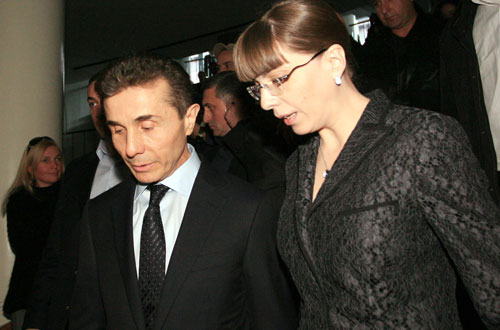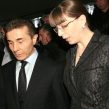
Georgian Dream: Ivanishvili Enlists Allies for His Political Project
Publication: Eurasia Daily Monitor Volume: 9 Issue: 16
By:

Bidzina Ivanishvili, the billionaire seeking political power in Georgia, is recruiting political allies to his proprietary Georgian Dream movement, ahead of parliamentary elections. A newcomer to politics, Ivanishvili started out by dismissing all of the numerous factions in the extra-parliamentary opposition as useless (he admitted to have financed some of them since 2007). He also rejects the Christian-Democrat parliamentary opposition, which has set an unusual Georgian example of rational negotiations of the opposition with the government. Instead, Ivanishvili would look for “new faces” and “healthy forces” as allies (see EDM, October 14, 19, November 7, December 19, 2011).
Thus far, however, Ivanishvili’s allies are neither new as political figures nor self-sustaining as parties. They form small groups led by veteran politicians, whose future depends on Ivanishvili’s funding; and he seems to treat them accordingly. He has not yet learned to accord them pro forma honors in public, never yet sharing a platform or spotlight with them. Nor has he learned to take advice consistently from the more experienced among them, which might have spared Ivanishvili some of his regular gaffes. The Ivanishvili family’s decision to transfer the post of Georgian Dream leader from Bidzina to his wife, Ekaterine (“Georgia Billionaire Appoints Wife As Movement Leader While Parliament Enacts Financial Safeguards,” EDM, January 24) also shows little esteem for this movement’s ad hoc allies. These include, thus far, four political groups, now also joined by the senior diplomat Tedo Japaridze in a personal capacity (see below).
Almost from the inception of his bid for power (October 2011), Ivanishvili identified Irakli Alasania’s group, Our Georgia-Free Democrats, and the Republican Party (led by the Berdzenishvili brothers and the Usupashvili-Khidasheli husband-and-wife team) as his allies. These groups hold three seats in Parliament between them. Their leaders have been around continuously since the 1990s in Georgian politics. The Republicans lack government or administrative experience; they seem hardly to have graduated from the NGOs’ environment. According to the latest survey, commissioned by the Ivanishvili-funded Georgian Development Research Institute, Alasania’s party has only 1.5 percent support countrywide, and the Republican Party has less than 1 percent support (Civil Georgia, December 8, 12).
Alasania, the youngest among Ivanishvili’s allies, is nevertheless the most experienced, with a successful career in the state security and diplomatic services behind him. He resigned from government to enter politics in 2009, hesitating for some time between a radical opposition stance and negotiations with the government. Consequently, he missed the chance to build on his 2010 performance in the local elections: 19 percent for himself in Tbilisi and 9 percent country-wide for his bloc (which was broader at that time than now). With his team of former colleagues from the diplomatic service, Alasania has no organization in the country and seems to depend on Ivanishvili’s support for building one. Alasania plans to focus on the Samegrelo region (Mingrelia) in the upcoming parliamentary election.
With a reputation as pro-American and contacts in Washington, Alasania is supposed to reassure those concerned about Ivanishvili’s inexperience with foreign policy and his vague comments about NATO and Russia. With that reputation, however, Alasania claims on pro-opposition airwaves that US President Barack Obama will soon advise Georgian President Mikheil Saakashvili to retire from politics in 2013, when Saakashvili’s second presidential term expires (Maestro TV cited by Civil Georgia, January 23).
After dismissing the value of the radical extra-parliamentary opposition, Ivanishvili has nevertheless enlisted two of those factions as his allies. Again, neither is a “fresh face.” Zviad Dzidziguri, the head of a Conservative Party faction (following a split) took part in Georgia’s serial “regime changes” over the last 20 years. Apparently, his added value to Ivanishvili is a seat on the Central Electoral Commission. Koba Davitashvili, Tbilisi city councilman and head of a nominal People’s Party, is a long-standing friend of Dzidziguri and the Republican team, joining Ivanishvili’s camp with them.
Tedo Japaridze is a figure of an entirely different caliber. Formerly a foreign policy analyst in Moscow during Soviet times (1974-89), Georgian Ambassador to the United States (1994-2002) and Foreign Minister (2003-2004), Japaridze was abruptly dismissed as a minister (generational gap being one explanation), turned publicly critical of the government after 2007 while still in the diplomatic service, and was finally released from the service in 2011. On January 20 and 23, 2012, Japaridze made public his decision to join Ivanishvili’s team as foreign policy adviser (Open Democracy, January 20; Civil Georgia, January 23).
While the personal grudge is clearly visible in Japaridze’s announcement, he may introduce some professionalism to Ivanishvili’s amateurish operation, perhaps even on internal politics. In a take-charge tone, Japaridze declares that all generations of government personnel, from that of the “early 1990s” to the present, are necessary and should be retained [i.e., if Ivanishvili’s forces win the upcoming elections]. The tactical gambit seems obvious, but (if at all feasible) it looks backward to pre-2003, which is also where Ivanishvili comes from in terms of mentality, and is an underlying implication of the entire Ivanishvili phenomenon.
Japaridze’s announcement replays a theme that he had sounded throughout his diplomatic career: Georgia needs to clarify Russia’s objectives, “understand where we stand and what the prospects for relations with Russia are … Some ways should be found to sort out relations to some extent.” If only it were up to Georgia.




